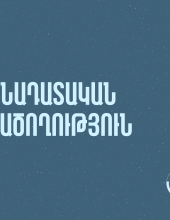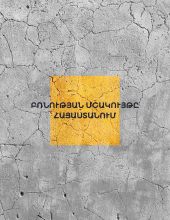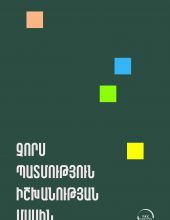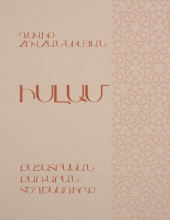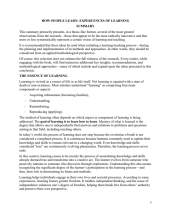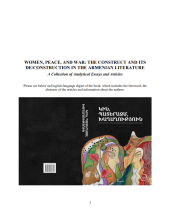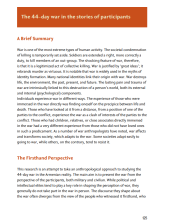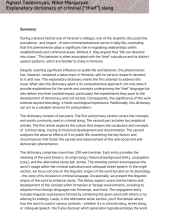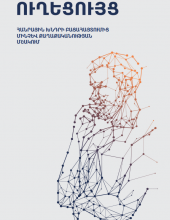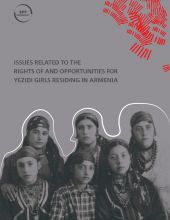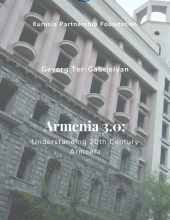Education and learning are the primary areas that need improvement and development in Armenia. EPF has been producing video presentations (called ‘Jam Sessions’) and off-line publications under the heading ‘EPF University.’ EPF has worked on and explored specific topics that have not been much articulated or debated in Armenia including research on such values as democracy in Armenian literature; the roots of violence in Armenia; expressions of tolerance and intolerance in literature and education; a study of 20th century Armenia with special emphasis on the impact of Soviet times on today’s Armenia and alternative history education; the concept of power and its various manifestations. EPF has developed several practical manuals on conflict reporting by media, critical thinking, Armenia and the European Union, democracy and human rights, gender, various aspects of judicial reform, religious tolerance, etc. These publications are disseminated in online and print versions. They are available on EPF’s on-line resource platforms such as CSO Depo portal and EPF’s website which have a unique archive that stores numerous lectures, publications, research papers, books and articles. They are also disseminated via international publication networks, such as academia.edu and goodreads. In Armenia, these videos and publications are disseminated widely among the public, as well as educational and research institutions, libraries, CSOs, governmental, international and other organizations. They are also used by EPF as well as others in trainings, strategic discussions, and other knowledge-relevant activities. These materials are intended to provide civil society with a deeper level of knowledge on the topics that are important for it to function successfully. The need for such materials is determined by the fact that most of the time these issues are not discussed at the sufficient depth in either formal education institutions or outside of them, whereas the capacity to orientate in these issues determines the success of concrete undertakings and projects of civil society.
“EPF University” covers four large thematic directions:
- Critical Thinking
- War and Peace
- Civil Society
- Education, methodology of history, culture and values
In 2023-2027, EPF and its partners and beneficiaries will continue creating alternative content and a unique archive for civil society, students, young scholars and other groups, contributing to the development of non-formal education and raising meaningful discussions. These materials will focus on issues relevant for civil society, such as on management, leadership, networks, facilitation, critical thinking, tolerance, advocacy, gender, human rights, the culture of violence, types of state and social power, research methods, law, political science and democracy. Also, EPF will work on building a platform of interconnected individuals and institutions via discussions of the materials produced via this work.
A part of this approach is EPF’s practice of engaging interns and fellows, both from Armenia and internationally, and providing them with a learning environment to enhance their skills, as well as contribute to EPF’s activities.
Below is the list of publications under "EPF University" heading:
- Gevorg Ter-Gabrielyan - Critical Thinking (in Armenian)
- Aghasi Tadevosyan, Nikol Margaryan - How People Learn: Experiences of Learning (in Armenian / in English), 2025)
-
Women, Peace, and War: The Construct And Its De/construction in the Armenian Literature. A Collection of Analytical Essays and Articles (in Armenian, 2025)
-
Davit Hovhannisyan - Explanatory Dictionary of Islamic Terms (in Armenian, 2024)
-
Aghasi Tadevosyan - The 44-day War in The Stories of Participants (in Armenian / in English, 2024)
-
Aghasi Tadevosyan, Nikol Margaryan: Explanatory Dictionary of Criminal (“Thief”) Slang: (in Armenian / in English, 2023)
- Guide in Publishing (in Armenian, 2022)
- Four Stories about Power (in Armenia, 2022)
-
Guide: From Public Issue to Policy Development (in Armenian, 2021)
-
EPF Gender Policy (in Armenian / in English, 2021)
-
Towards a Civics Advancement Measurement Tool (CCRL) (in Armenian / in English, 2021)
-
Manual for Trainers Mainstreaming Gender into Policies (in Armenian, 2021)
-
Ethical Guidelines for Social Research: A Practical Guide (in Armenian, 2021)
-
About the Methodology of Systemic Thought Activity (MSTA) and Creative Games (in Armenian / in English, 2021)
-
Culture of Violence in Armenia (in Armenian) (in Armenian, 2020)
-
Culture of Violence in Armenia: Reflection and Recommendation (in Armenian) (in Armenian, 2021)
-
Issues Related to the Rights of and Opportunities for Yezidi Girls Residing in Armenia (in Armenian / in English, 2020)
-
Critical Thinking: Logical Fallacies and Misleading Rhetorical Tricks (in Armenian, 2019)
(հայերեն, 2019)
-
Manifestations of Tolerance and Intolerance in Armenian Literature (in Armenian, 2017)

